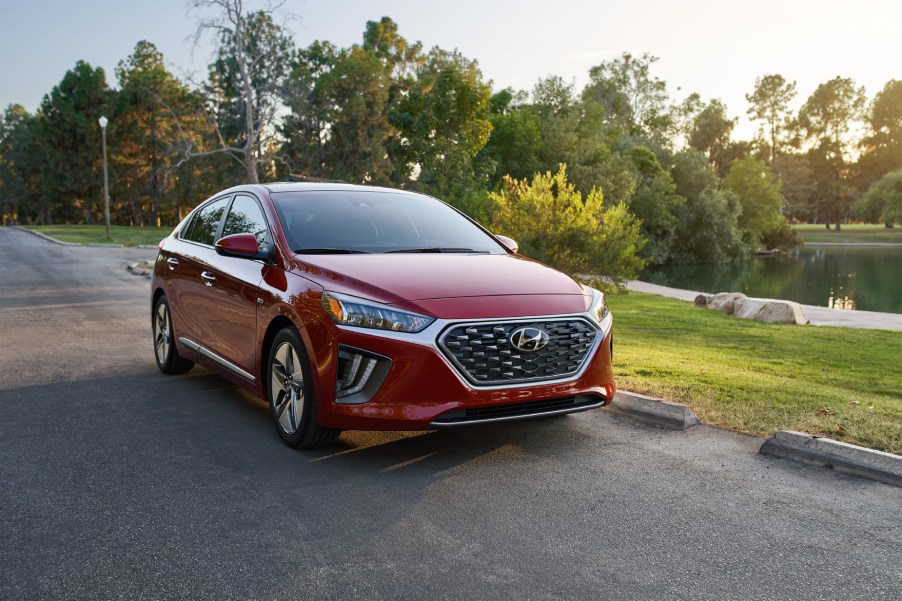
The 2020 Hyundai Ioniq Is Boring, but That Might Be a Good Thing
Hybrids aren’t a new concept. In fact, these fuel-efficient models are a mainstay for drivers who want to remain eco-conscious. When you’re behind the wheel, you’ll feel like you’re doing your part to save the world. It doesn’t hurt that you’re also saving money on gas, either. The 2020 Hyundai Ioniq works hard to make its incredible fuel economy its defining trait. But is that enough for buyers to pull the trigger?
Some automakers aim to add everything but the kitchen sink to their models. While this may be enticing to the buyer, it’s not always a good thing. Frequently, the more bells and whistles a vehicle has, the more likely the manufacturer is attempting to hide flaws. When it comes to the Ioniq, Hyundai took a precise approach to this hybrid by honing in on just a few features and making them spectacular.
So what exactly makes this underappreciated vehicle stand out from the crowd? Let’s take a closer look at everything the 2020 Hyundai Ioniq has to offer. Believe us; you’ll be just as excited as we are about this sleeper hit.
The 2020 Hyundai Ioniq may not be a jack of all trades

Affordable hybrids appeal to a particular demographic, and these drivers won’t likely have a leadfoot. That’s why it shouldn’t be too big of a deal that the 2020 Hyundai Ioniq delivers a somewhat lackluster driving experience. That’s not to say the car drives poorly, as it actually handles quite decently during daily driving situations. Rather, the Ioniq is relatively slow to accelerate, leaving many drivers wanting more.
The Ioniq is powered by a 1.6-liter four-cylinder engine and an electric motor, which produce a combined output of 139 hp. Whether this underwhelming powertrain could factor into your buying decision or not may depend on your prior familiarity with driving a hybrid.
In CNET’s review of the 2020 Hyundai Ioniq, Emme Hall explained the frustration of being behind the wheel of the hybrid. “It tends to upshift before actually getting into the heart of the power band,” Hall wrote. “Sport mode helps things a little, but for those new to hybrids, the Ioniq’s lackluster acceleration might be a deal-breaker.”
Interior appointments and technologies won’t do much to excite, either, as the 2020 Hyundai Ioniq is an economy car at heart. While it comes with several driver-assistance technologies, significant systems like pedestrian detection and blind-spot monitoring are only available on higher trims. However, eco-conscious drivers will be pleased to know that the Hyundai utilizes Earth-friendly materials such as sugar cane and volcanic stone throughout the Ioniq’s interior.
The Ioniq is a master of one key element
The Toyota Prius has long been the most dominant hybrid on the market. However, the Ioniq has recently become a competitive alternative. Few vehicles can even come close to the 2020 Hyundai Ioniq’s EPA-estimated fuel efficiency rating of 58 MPG city/highway combined. This figure alone makes it worthy of serious consideration for anyone in the market for a hybrid.
Best of all, you won’t have to pay a ton to start taking advantage of these gas mileage savings. The 2020 Hyundai Ioniq has a starting MSRP of just $23,200, and the range-topping Limited model only costs $31,200.
It is important to note that any model above the base-level Blue trim does have a slight drop in fuel economy. The EPA estimates that all other models achieve 55 MPG combined. Regardless, upgrading to at least the SE or SEL may be worth the gas mileage dip thanks to the addition of more driver-assistance features.
Should you put this hybrid on your wish list?
While the 2020 Hyundai Ioniq isn’t an outright better buy over the 2020 Toyota Prius, it is worth a test drive. The Ioniq has a sleeker design that’ll appeal to more consumers. Some drivers may feel more comfortable behind the wheel of Hyundai’s hybrid than they would in the Prius, but you’ll never know until you give it a chance. The Ioniq certainly has qualities that we find appealing, and we’re sure that you will, too. Happy driving!


